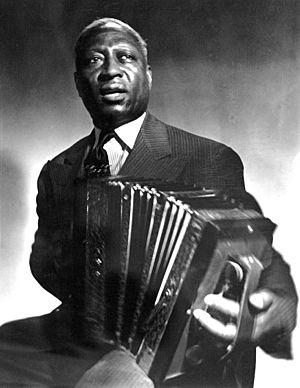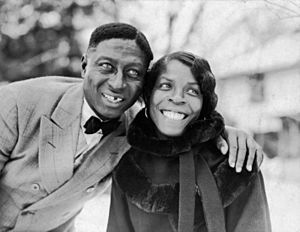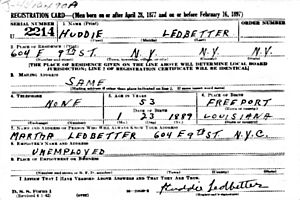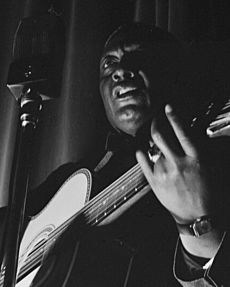Lead Belly facts for kids
Quick facts for kids Lead Belly |
|
|---|---|

Lead Belly with a melodeon c. 1942
|
|
| Background information | |
| Birth name | Huddie William Ledbetter |
| Also known as | Lead Belly, Leadbelly |
| Born | January 20, 1888 Mooringsport, Louisiana, U.S. |
| Died | December 6, 1949 (aged 61) New York City, U.S. |
| Genres |
|
| Occupation(s) | Singer, musician |
| Instruments |
|
| Years active | 1903–1949 |
Huddie William Ledbetter (born January 20, 1888 – died December 6, 1949), known as Lead Belly, was an American folk and blues singer. He was famous for his powerful voice and amazing skill on the twelve-string guitar. He introduced many popular folk songs, like "In the Pines", "Goodnight, Irene", "Midnight Special", "Cotton Fields", and "Boll Weevil".
Lead Belly mostly played the twelve-string guitar. But he also played the piano, mandolin, harmonica, violin, and windjammer. Sometimes, he would sing while clapping his hands or stomping his foot.
His songs covered many styles, including gospel music, blues, and folk music. They were about different topics like prison life, cowboys, and dancing. He also wrote songs about famous people like Franklin D. Roosevelt and Adolf Hitler. Lead Belly was honored after his death. He was added to the Rock and Roll Hall of Fame in 1988 and the Louisiana Music Hall of Fame in 2008.
Even though many records call him "Leadbelly", he always wrote his name as "Lead Belly". This is how it's spelled on his tombstone and by the Lead Belly Foundation.
Contents
Discovering Lead Belly's Story
His Early Life
Huddie William Ledbetter was born near Mooringsport, Louisiana. He was the younger of two children. His parents, Sallie Brown and Wesley Ledbetter, got married in February 1888. When Huddie was five, his family moved to Bowie County, Texas.
By 1910, Huddie was living with his first wife, Aletha Henderson. She was 19 years old. Lead Belly got his first instrument, an accordion, from his uncle Terrell in Texas. By his early twenties, he had two children. He left home to work as a guitarist and sometimes as a laborer.
His Musical Journey
By 1903, Huddie was already a skilled musician. He was known as a great singer and guitarist.
Between 1915 and 1939, Lead Belly spent time in prison in Louisiana. In the 1930s, he was "discovered" by folklorists John Lomax and his son Alan Lomax. They visited prisons to record local music for the Library of Congress. This was part of a project to save traditional music during the Great Depression.
The Lomaxes were very impressed by Lead Belly's strong voice and many songs. They recorded him in 1933. They came back in 1934 and recorded hundreds more of his songs. While in prison, Lead Belly might have first heard "Midnight Special". His versions of this song became very famous.
On August 1, 1934, Lead Belly was released from prison. The Lomaxes had taken a record and a request for his release to the governor. This included his well-known song, "Goodnight Irene". Lead Belly and the Lomaxes believed this helped him get out of prison.
After his release, Lead Belly found it hard to find work because of the Great Depression. In September, he asked John Lomax to hire him as a driver. For three months, he helped Lomax collect folk songs in the South.
In December 1934, Lead Belly performed at a meeting in Pennsylvania. He was written about in the news as a person who sang his way out of prison. In January 1935, he and Lomax arrived in New York City. Newspapers were eager to write about the "singing convict". Time magazine even made a newsreel about him. Lead Belly became famous, but he didn't become rich.
In early 1935, Lead Belly recorded many songs with American Record Corporation (ARC). Only six of these were released during his lifetime. These recordings didn't sell well. This might be because ARC released only his blues songs, not the folk songs he was better known for. Lead Belly continued to struggle financially. Most of his money came from touring, not from selling records. In February 1935, he married Martha Promise, who came from Louisiana to join him.
In 1936, Lead Belly returned to New York alone. He performed at Harlem's Apollo Theater. He also performed for folk music fans. He became good at explaining his songs and Southern black culture. He was especially good at children's game songs.
In 1939, Lead Belly was in prison again. Alan Lomax helped him with legal costs. After his release, Lead Belly appeared on a CBS radio show called Back Where I Come From. He also performed in nightclubs in New York City. He became friends with other folk musicians like Woody Guthrie and Pete Seeger.
In 1940, Lead Belly recorded for RCA Victor, a big record company. These recordings became the album, The Midnight Special and Other Southern Prison Songs. This album was very important for African American folk music.
In 1941, Lead Belly met Moses Asch, who owned a small record label. Between 1941 and 1944, Lead Belly released three albums with Asch Recordings. He also recorded for the Library of Congress.
In 1944, he recorded for Capitol Records in California. In 1949, Lead Belly had his own radio show, Folk Songs of America. Later that year, he started his first European tour in France. But he became ill and was diagnosed with ALS (Lou Gehrig's disease). Lead Belly was the first American blues musician to become famous in Europe. His last concert was in Texas, honoring his old mentor, John Lomax.
Lead Belly died later that year in New York City. He was buried in Louisiana. There is a statue honoring him in Shreveport.
How He Got His Nickname

There are different stories about how Ledbetter got the nickname "Lead Belly". It probably happened when he was in prison. Some say his fellow prisoners called him "Lead Belly" because of his last name and his physical strength. Others say he got the name after being shot in the stomach.
Lead Belly's Unique Style
Lead Belly called himself "King of the Twelve-String Guitar". Even though he played other instruments, people mostly remember him with his large Stella twelve-string guitar. This guitar had a longer neck, which made the strings tighter.
Lead Belly often played with finger picks. He used a thumb pick to play bass lines that sounded "tricky" and "inventive". This style, with low tunings and heavy strings, made his recordings sound like a piano. Some experts think his guitar playing was inspired by barrelhouse piano and the Mexican Bajo Sexto guitar.
His guitar tunings are still discussed by musicians today. He likely tuned his guitar strings to each other, so the exact notes changed as the strings wore out. This "down-tuning" was common before modern guitar parts were invented. It helped stop the guitar's neck from bending. Pete Seeger made Lead Belly's playing style popular. Seeger used the twelve-string guitar and taught others using Lead Belly's techniques.
In some of his songs, Lead Belly made a special grunt sound between verses, like "haah!" You can hear this in songs like "Looky Looky Yonder" and "Take This Hammer". In "Take This Hammer", Lead Belly explained that "Every time the men say, 'Haah,' the hammer falls." This "haah" sound was also used by railroad workers to help them work together.
Lead Belly's Lasting Impact
In 1976, a movie called Leadbelly was made about his life. It was directed by Gordon Parks.
In 1951, the Weavers' song "Good Night, Irene" (based on Lead Belly's "Irene") was the first folk song to reach #1 on the U.S. music charts. It sold about two million copies.
Kurt Cobain of the band Nirvana helped keep Lead Belly's music alive. Nirvana performed "Where Did You Sleep Last Night" (which Lead Belly called "In the Pines") on their MTV Unplugged in New York show. Cobain often talked about how much Lead Belly's music influenced him.
Bob Dylan said that a Lead Belly record with "Cotton Fields" on it changed his life. He said it "transported me into a world I'd never known." Dylan also honored Lead Belly in his song "Song to Woody".
Lonnie Donegan's song "Rock Island Line" in 1955 started the UK skiffle music craze. George Harrison of The Beatles said, "if there was no Lead Belly, there would have been no Lonnie Donegan; no Lonnie Donegan, no Beatles." This shows how important Lead Belly was to music history.
In 2015, many events celebrated Lead Belly's 125th birthday. The Kennedy Center and the Grammy Museum held a tribute concert. The Royal Albert Hall in London also held a "Lead Belly Fest".
The Titanic Song
The sinking of the Titanic in 1912 inspired Lead Belly to write "The Titanic". This was his first song on the twelve-string guitar. The song is about the African-American boxer Jack Johnson being denied a spot on the Titanic. Johnson was indeed denied passage on a ship because he was black, but it wasn't the Titanic. Lead Belly's song includes the line: "Jack Johnson tried to get on board. The Captain, he says, 'I ain't haulin' no coal!' Fare thee, Titanic! Fare thee well!" Lead Belly later said he had to leave out this part when playing for white audiences.
Lead Belly's Music
Singles Released During His Life
| Release Year | Title
(A-side/B-side) |
Label | Notes |
|---|---|---|---|
| 1935 | "All Out and Down"
"Packin' Trunk" |
Banner | American Record Corporation released these songs on six different labels. |
| Melotone | |||
| Oriole | |||
| Perfect | |||
| Romeo | |||
| Paramount | |||
| 1935 | "Four Day Worry Blues"
"New Black Snake Moan" |
Banner | American Record Corporation released these songs on six different labels. |
| Melotone | |||
| Oriole | |||
| Perfect | |||
| Romeo | |||
| Paramount | |||
| 1936 | "Becky Deem, She Was a Gamblin' Girl"
"Pig Meat Papa" |
Banner | American Record Corporation released these songs on six different labels. |
| Melotone | |||
| Oriole | |||
| Perfect | |||
| Romeo | |||
| Paramount | |||
| 1940 | "Sail On, Little Girl, Sail On"
"Don't You Love Your Daddy No More?" |
Bluebird | |
| 1940 | "Alberta"
"T.B. Blues" |
Bluebird | |
| 1940 | "Easy Rider"
"Worried Blues" |
Bluebird | |
| 1941 | "Roberta"
"The Red Cross Store Blues" |
Bluebird | |
| 1941 | "New York City"
"You Can't Lose-a Me Cholly" |
Bluebird | |
| 1941 | "Good Morning Blues"
"Leaving Blues" |
Bluebird | |
| 1942 | "I'm on My Last Go-Round" | Bluebird | This was the b-side to "Thirsty Mama Blues" by the Hot Lips Page Trio. |
| 1945 | "Rock Island Line"
"Eagle Rock Rag" |
Capitol | Included in a five-disc album called The History of Jazz Vol. 1. |
| 1946 | "Yellow Gal"
"When the Boys Were on the Western Plain" |
Musicraft | |
| 1946 | "Roberta"
"John Hardy" |
Musicraft | |
| 1946 | "Where Did You Sleep Last Night?"
"In New Orleans" |
Musicraft | |
| 1946 | "Bill Brady"
"Pretty Flowers in Your Back Yard" |
Musicraft | |
| 1946 | "Easy Rider"
"Pigmeat" |
Disc | |
| 1947 | "Sweet Mary Blues"
"Grasshopers in My Pillow" |
Capitol | |
| 1948 | "Irene"
"Backwater Blues" |
Capitol | |
| 1948 | "Digging My Potatoes"
"Defense Blues" |
Disc |
Albums Released During His Life
| Release Year | Title | Label | Notes |
|---|---|---|---|
| 1939 | Negro Sinful Songs | Musicraft | |
| 1940 | The Midnight Special and Other Southern Prison Songs | Victor | |
| 1941 | Play Parties in Song and Dance | Asch | |
| 1942 | Work Songs of the U.S.A. | Asch | |
| 1944 | Songs by Lead Belly | Asch | |
| 1946 | Negro Folk Songs | Disc | |
| 1947 | Midnight Special | Disc | Featuring Woody Guthrie and Cisco Huston. |
Music Released After His Death
Library of Congress Recordings
The Library of Congress recordings were made by John and Alan Lomax from 1934 to 1943. They were released in a six-volume series by Rounder Records:
- Midnight Special (1991)
- Gwine Dig a Hole to Put the Devil In (1991)
- Let It Shine on Me (1991)
- The Titanic (1994)
- Nobody Knows the Trouble I've Seen (1994)
- Go Down Old Hannah (1995)
Folkways Recordings
The Folkways recordings were made for Moses Asch from 1941 to 1947. They were released in a three-volume series by Smithsonian Folkways:
- Where Did You Sleep Last Night, Lead Belly Legacy, Vol. 1 (1996)
- Bourgeois Blues, Lead Belly Legacy, Vol. 2 (1997)
- Shout On, Lead Belly Legacy, Vol. 3 (1998)
Smithsonian Folkways has also released other collections of his recordings:
- Leadbelly Sings Folk Songs (1989)
- Lead Belly's Last Sessions (4-CD box set, 1994) – these were his only commercial recordings on magnetic tape.
- Lead Belly Sings for Children (1999)
- Folkways: The Original Vision, Woody Guthrie and Lead Belly (2004)
- Lead Belly: The Smithsonian Folkways Collection (2015)
Other Collections
- Huddie Ledbetter's Best (1989, BGO Records) – recordings made for Capitol Records in 1944.
- King of the 12-String Guitar (1991, Sony/Legacy Records) – a collection of blues songs and prison ballads recorded in 1935.
- Private Party November 21, 1948 (2000, Document Records) – a recording of Lead Belly performing at a private party.
- Take This Hammer, When the Sun Goes Down series, vol. 5 (2003, RCA Victor/Bluebird Jazz) – a CD collection of all 26 songs Lead Belly recorded for Victor Records in 1940.
- A Leadbelly Memorial, Vol II (1963, Stinson Records, SLP 19).
- The Definitive Lead Belly (2008, Not Now Music) – 50 songs on two CDs.
- Leadbelly – American Folk & Blues Anthology (2013, Not Now Music) – 75 songs on three CDs.
- American Epic: The Best of Lead Belly (2017, Lo-Max, Sony Legacy, Third Man)
See also
 In Spanish: Leadbelly para niños
In Spanish: Leadbelly para niños
 | Roy Wilkins |
 | John Lewis |
 | Linda Carol Brown |



